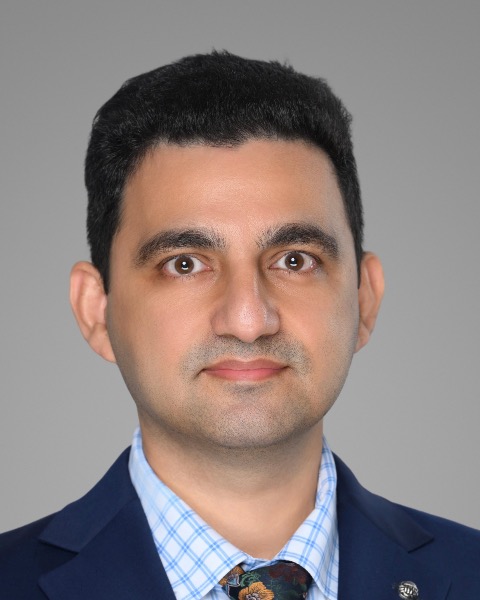Sunday Poster Session
Category: Diet, Nutrition, and Obesity
P0578 - Nutritional Challenges in a Patient With Multiple Entero-Enteric and Enterocutaneous Fistulas Complicated by Intraabdominal Abscess
Sunday, October 26, 2025
3:30 PM - 7:00 PM PDT
Location: Exhibit Hall

Vishal Chandel, MD
Brigham and Women's Hospital, Harvard Medical School
Boston, MA
Presenting Author(s)
Vishal Chandel, MD1, Neel Chandel, MD2
1Brigham and Women's Hospital, Harvard Medical School, Boston, MA; 2West Virginia University Charleston Area Medical Center, Charleston, WV
Introduction: The management and successful closure of entero-enteric fistulas (EEF) & enterocutaneous fistulas (ECF) can be challenging in post Roux-en-Y gastric bypass (RYGB) patients. Due to the complexity and low incidence of EC fistulas, there is a lack of widely accepted guidelines on their management. Nonetheless, nutrition management to provide adequate nutrient requirements, maintain fluid and electrolyte balance, and enhance appropriate fistula healing is attainable. Whether enteral (EN), parenteral (TPN), or oral nutrition is provided it’s important to maximize protein intake. Expert consensus recommends 1.5-2 gm/kg/day, increasing to as high as 2.5 gm/kg/day for high output fistulas.
Case Description/
Methods: We describe our experience with a 62 y/o woman s/p RYGB, complicated by (c/b) gastro-gastric fistula (GGF) and dilated Gastro-jejunal (GJ) pouch, s/p Laparoscopic GGF takedown, redo-GJ, remnant G-tube placement c/b GJ leak s/p lap washout due to intraabdominal abscess at GJ, s/p IR drain. Patient initially was tolerating TF (tube feeds) via G-tube in her remnant stomach, but course was c/b persistent GJ leak. Patient was diagnosed with unspecified protein-calorie-malnutrition in the context of acute illness, given prolonged hypocaloric intake and mild-to-moderate muscle wasting on nutrition focused physical examination. TPN was initiated when patient was unable to consistently receive goal EN due to intolerance, persistent GJ-leakage, intraabdominal abscess and multiple EC fistulas. Endovaccum therapy was instituted for fistulous tract healing. Based on healing and output control, TF were reintroduced slowly. Careful interplay of nutrition management with TPN alternating with EN with variable daily rates based on daily clinical progression were paramount in the course.
Discussion: Nutritional and metabolic management in complex multiple EEF or ECF is challenging and associated with high morbidity and mortality. Patient outcomes can be improved by adjusting the nutrition regimen frequently based on daily fluid, protein and electrolyte losses. Overall goal is closure of fistula and resumption of an oral diet. While some patients achieve this, others require home nutrition support for chronic fistulas. Intensive and complex nutritional and metabolic support creates a favorable basis for spontaneous closure of ECF's, improving ECF prognosis. However, reducing the treatment duration, decreasing incidence of complications and preventing further recurrence are still the areas for future research.
Disclosures:
Vishal Chandel indicated no relevant financial relationships.
Neel Chandel indicated no relevant financial relationships.
Vishal Chandel, MD1, Neel Chandel, MD2. P0578 - Nutritional Challenges in a Patient With Multiple Entero-Enteric and Enterocutaneous Fistulas Complicated by Intraabdominal Abscess, ACG 2025 Annual Scientific Meeting Abstracts. Phoenix, AZ: American College of Gastroenterology.
1Brigham and Women's Hospital, Harvard Medical School, Boston, MA; 2West Virginia University Charleston Area Medical Center, Charleston, WV
Introduction: The management and successful closure of entero-enteric fistulas (EEF) & enterocutaneous fistulas (ECF) can be challenging in post Roux-en-Y gastric bypass (RYGB) patients. Due to the complexity and low incidence of EC fistulas, there is a lack of widely accepted guidelines on their management. Nonetheless, nutrition management to provide adequate nutrient requirements, maintain fluid and electrolyte balance, and enhance appropriate fistula healing is attainable. Whether enteral (EN), parenteral (TPN), or oral nutrition is provided it’s important to maximize protein intake. Expert consensus recommends 1.5-2 gm/kg/day, increasing to as high as 2.5 gm/kg/day for high output fistulas.
Case Description/
Methods: We describe our experience with a 62 y/o woman s/p RYGB, complicated by (c/b) gastro-gastric fistula (GGF) and dilated Gastro-jejunal (GJ) pouch, s/p Laparoscopic GGF takedown, redo-GJ, remnant G-tube placement c/b GJ leak s/p lap washout due to intraabdominal abscess at GJ, s/p IR drain. Patient initially was tolerating TF (tube feeds) via G-tube in her remnant stomach, but course was c/b persistent GJ leak. Patient was diagnosed with unspecified protein-calorie-malnutrition in the context of acute illness, given prolonged hypocaloric intake and mild-to-moderate muscle wasting on nutrition focused physical examination. TPN was initiated when patient was unable to consistently receive goal EN due to intolerance, persistent GJ-leakage, intraabdominal abscess and multiple EC fistulas. Endovaccum therapy was instituted for fistulous tract healing. Based on healing and output control, TF were reintroduced slowly. Careful interplay of nutrition management with TPN alternating with EN with variable daily rates based on daily clinical progression were paramount in the course.
Discussion: Nutritional and metabolic management in complex multiple EEF or ECF is challenging and associated with high morbidity and mortality. Patient outcomes can be improved by adjusting the nutrition regimen frequently based on daily fluid, protein and electrolyte losses. Overall goal is closure of fistula and resumption of an oral diet. While some patients achieve this, others require home nutrition support for chronic fistulas. Intensive and complex nutritional and metabolic support creates a favorable basis for spontaneous closure of ECF's, improving ECF prognosis. However, reducing the treatment duration, decreasing incidence of complications and preventing further recurrence are still the areas for future research.
Disclosures:
Vishal Chandel indicated no relevant financial relationships.
Neel Chandel indicated no relevant financial relationships.
Vishal Chandel, MD1, Neel Chandel, MD2. P0578 - Nutritional Challenges in a Patient With Multiple Entero-Enteric and Enterocutaneous Fistulas Complicated by Intraabdominal Abscess, ACG 2025 Annual Scientific Meeting Abstracts. Phoenix, AZ: American College of Gastroenterology.
